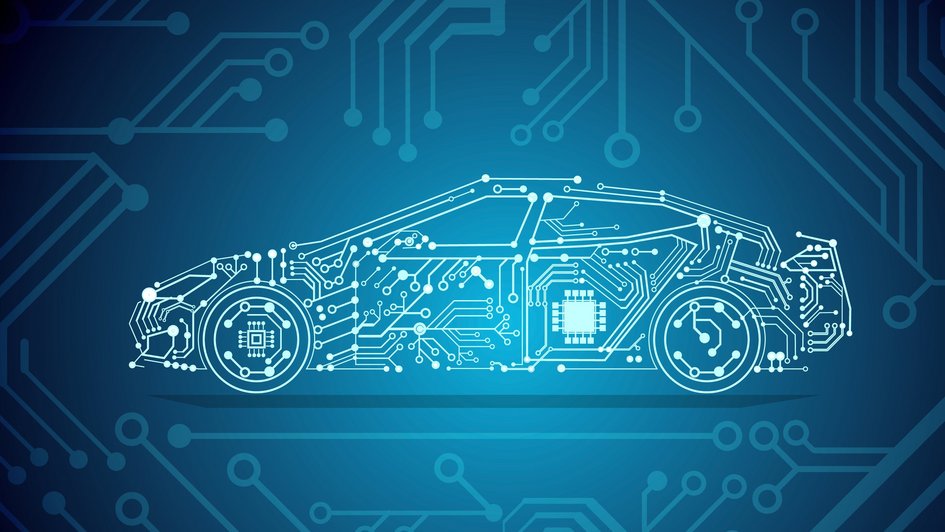Fahrzeuginformatik im Praxisverbund
Are you interested in connected and autonomous driving and want to understand the technologies behind it?
On the Automotive Informatics (B.Sc.) degree programme at Ostfalia University of Applied Sciences, you will learn to become an IT professional in the automotive industry. You can become a software or system developer and are ideally prepared for current and future developments in the field of vehicle informatics. Topics such as connected and autonomous driving and sustainable mobility will enable you to actively participate in the transformation of the automotive industry. You will develop skills in the field of systems engineering - from the product idea to product definition and implementation in practice. Be part of the future of mobility!
Facts at a glance
why Automotive Engineering at Ostfalia?
- Practical teaching: laboratories, workshops and realistic projects.
- Individual support: Support programmes such as MatheLift make it easier for you to get started.
- Innovative teaching content: Focus on autonomous driving, vehicle networking and digital methods.
- Top career opportunities: Excellent contacts to the automotive and supplier industry.

Our goals - future-orientated and innovative
Your cookie settings have blocked this video.
With us, you will receive comprehensive training that starts with a solid grounding in maths, computer science and electrical engineering.
You will then specialise specifically in the field of vehicles and deepen your knowledge there. The course places particular emphasis on future-oriented topics such as software and system development, digitalisation, data science and sustainable mobility.
Practical tasks and projects give you the opportunity to experience future vehicle concepts at first hand and understand their comprehensive networking. This will prepare you optimally for exciting challenges and career paths in the automotive industry.
Structure of the study programme
1.-4th semester: Basic studies
In the foundation course of the Bachelor's degree programme in Automotive Engineering, you will learn the most important fundamentals of automotive engineering. These include, for example: technical mechanics, mathematics, computer science, production engineering, electronics and measurement technology.
The content is made more tangible through exercises and laboratory practicals. This allows you to directly apply what you have learnt in practice.
5.-6th semester: Choice of a subject block
The specialised studies take place in practical projects and small groups. You can choose your specialisation from 4 subject blocks. The content of the subject blocks can be found in the next section.
In the 7th semester, you will have a practical phase and write your Bachelor's thesis.
Your cookie settings have blocked this video.
Theme blocks
You can decide which subject block is right for you during your degree programme. Each block comprises five compulsory modules and you can also choose two compulsory elective modules to further deepen your interests.
The "Automotive Systems" specialisation is ideal for you if you want to specialise in the development of electronic vehicle systems and virtual test methods.
If you would rather focus on software development and the physical limits of a vehicle, then "Automotive Software" is your specialisation. Machine learning, mobile services and infotainment play a central role here.
The "Autonomous Mobility" specialisation prepares you for the field of autonomous driving, with a focus on machine perception and innovative mobility solutions that go beyond conventional local public transport.
In "Industrial Internet-of-Things ", you will deepen your knowledge of production and automation in order to monitor and optimise technical processes in real time.
Opportunities in the practice network
The content of the integrated degree programme (StiP) is basically identical, but offers additional practical phases so that the study sequence of the individual semesters differs. You have two different options for studying with integrated practice.
Practice-integrated degree programme
Students complete their studies in a partner company, where they familiarise themselves with engineering activities in the company at an early stage and are involved in practical work processes.
Training-integrated degree programme
Students complete an apprenticeship parallel to their studies. The training takes place in practical/training semesters, which are also integrated into the above-mentioned study programme.
If you are interested in a degree programme integrated with practical training (StiP), you must apply independently to a company and present your employment contract when you enrol at the university. If you need support, please contact our Career Service (external link, opens in a new window), the CentralStudent Advisory Service (external link, opens in a new window) or the Student Advisory Service:
Prof. Dr.-Ing. Volker von Holt
E-mail: v.von-holt(at)ostfalia.de (opens your email program)
Another way to gain practical experience alongside your studies:
Com-Bind-ING-Study
- Interested students apply for a subsidised ("working student") position at a partner company of the faculty parallel to enrolment
- The degree programme is full-time and follows the regular curriculum in 7 semesters (non-dual).
- During the lecture-free periods, the students are employed by the company as part of internships or other work activities and complete their student work at the company.
- In return, the students receive a (full-year) monthly payment from the company.
- After completing their studies, students can start directly at the company - provided there is mutual agreement. (In contrast to the dual study programme, there is no mutual obligation to take on the student)
Job vacancies with our partners in the practice network
Typical professional fields of activity
A degree in automotive informatics combines computer science with automotive engineering and opens up a wide range of career opportunities, not only in the automotive industry and related fields. Here are some potential career fields:
Software and system development
- Software development for vehicles: Development of software solutions for control units and infotainment systems.
- System integration: Integration of various software systems and components in the vehicle.
Research and development (R&D)
- Autonomous driving: Development of algorithms and systems for self-driving vehicles.
- Vehicle safety: Implementation of safety protocols and systems.
Data analysis and management
- Telematics: Analysing and managing vehicle data for improved services.
- Big data: processing large amounts of data to optimise vehicle functions.
Quality assurance and testing
- Software test engineer: Carrying out tests to ensure software quality.
- Error management: Identifying and rectifying software errors.
Project management and consulting
- IT project manager: Management of IT projects in the automotive sector.
- Technical consultant: advising companies on the implementation of new technologies.
Potential employers
- Car manufacturers: Direct involvement in vehicle development.
- Suppliers: Development of specific software solutions for vehicle components.
- Technology companies: working on innovative mobility solutions.
Future trends
- Electromobility: Development of software for electric drives.
- Networked vehicles: work on communication systems between vehicles and infrastructure.
A degree in vehicle informatics qualifies you for a variety of positions in a constantly evolving industry that increasingly relies on digital technologies.
Possible Master's programme
In addition to the Master's degree programmes offered by the Faculty of Automotive Engineering, you can also take advantage of the wide range of Master's degree programmes offered by Ostfalia or other educational institutions. The Faculty of Automotive Engineering offers 3 Master's degree programmes: Automotive Engineering (external link, opens in a new window), Automotive Systems Technologies (external link, opens in a new window)(part-time programme) and Automotive Service Technology and Processes (external link, opens in a new window).

